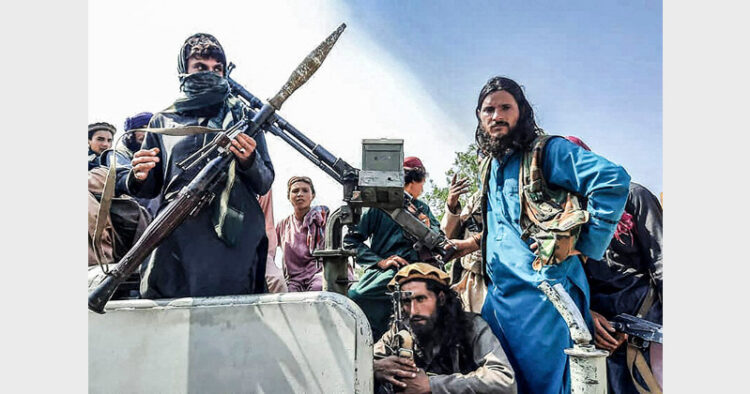In his virtual address to the joint meeting of the Shanghai Cooperation Organisation and the Russia-led Collective Security Treaty Organization last week, Prime Minister Narendra Modi rightly cautioned the international community against the current scenario in Afghanistan. He warned if " instability and fundamentalism” continued in Afghanistan, terrorist and extremist ideologies would “ be encouraged across the world." Prime Minister Modi suggested developing a code of conduct on ‘zero tolerance' towards terrorism in the region.
Well-meaning analysts say it is high time the international community, especially major world powers, heeded the Modi message and tamed the Taliban, the chief villain of peace and stability in Afghanistan. Regrettably, the approach of the major powers towards the Taliban has so far been discouraging. In the wake of the September 11 attacks, the United States launched its mission Operation Enduring Freedom to overthrow the then Taliban regime and dismantle all its jihadist assets, human and material, in the region. This demanded that before the United States and allies withdrew their troops from Afghanistan, the very objective of the war on terror in Afghanistan was accomplished and a people-friendly political system installed in the country. But this did not happen.
The previous Ashraf Ghani government in Kabul and its foreign backers left Afghanistan without caring for their moral obligation to humanity, especially Afghan women and minorities. The successive administrations in Washington had been in a hurry to quit Afghanistan. On February 29, 2020, the then Donald J Trump administration in Washington rushed to Doha to sign an agreement with the Taliban setting a timetable for the withdrawal of the United States and its allies from the region. Later, President Trump signed a military order to withdraw all troops from Afghanistan by January 15, 2021. The current Joseph R. Biden Jr. administration in Washington has followed the Trump plan and withdrawn from Afghanistan.
The chain of the disturbing events that have reportedly occurred since the US withdrawal from Afghanistan is very much along the expected lines. The Afghan scenario is likely to get worse in the coming days. In Kabul today, there is an interim government headed by its Prime Minister Mullah Mohammad Hasan Akhund. Akhund is aided by his Deputy Abdul Ghani Baradar, Interior Minister Sirajuddin Haqqani, Defence Minister Mullah Mohammad Yaqoob and Foreign Minister Amir Khan. This government has little respect for the rights of women and minorities in the country.
The analysts suggest the United States and other leading democracies in the world would do well to take to self-introspection and rein in the new Taliban regime in Kabul. The regime is a threat to world peace and the cherished values of all modern civilized states. Historically linked with the violent radical Islamist forces based in the Middle East, this predominantly Pashtun group aims at complete control over Afghanistan to establish its version of Islamic rule across the country and act as a base for global jihadist groups.
Dealing with the Taliban sternly is a must to eliminate al-Qaeda, an arch-enemy of modern, civilized values. The Taliban’s linkage with al Qaeda is well documented. It has throughout facilitated al Qaeda’s presence in the region. Today a significant part of al-Qaeda’s leadership remains based in the border region of Afghanistan and Pakistan. Qaeda has an active presence in at least 15 of Afghanistan’s 34 provinces. The Haqqani Network, an integral part of the Taliban, has been al-Qaeda’s closest ally since the 1980s. On their part, al-Qaeda-affiliated groups, such as Tehrik-e Taliban Pakistan (TTP), have been very helpful to the Taliban in toppling the previous government in Kabul.
Most importantly, Washington needs to act as a leader of the free world and be tough with Islamabad to rein in the Taliban. Islamabad has long been a partner of radical Islamist forces the world over. During 1980-89, Pakistan’s Inter-Service Intelligence acted as the coordinating centre for the Muslim Brotherhood, al Qaeda, the so-called charities– such as the Muslim World League, the International Relief Organization, the World Assembly of Muslim Youth and the Red Crescent– and radical Wahhabis from Saudi Arabia, Kuwait and the United Arab Emirates.
After the Soviet Union left Afghanistan, the ISI helped Egyptian terrorists Ayman al Zawahiri and Omar Abdel Rahman, al Qaeda supremo Osama bin Laden and Gulbuddin Hekmatyar to establish small operating bases. After 9/11, Islamabad allowed al Qaeda to move across the border into its remote Pakistan Frontier. It allowed al Qaeda and other jihadist groups to plan new terror attacks. Islamabad also allowed the Taliban’s Shura Council to locate itself in Quetta. Presently, ISI chief Faiz Hameed is said to be very friendly with Taliban leader Baradar.
( The author is a Delhi-based journalist )













Comments